- Home
- Matt Hilton
Dead Men's Harvest jh-6 Page 2
Dead Men's Harvest jh-6 Read online
Page 2
‘So old Walt’s finally retired then?’
‘No, Hunter, Walter Conrad is dead. He was murdered a few hours ago.’
Chapter 3
Three days earlier…
It was undignified to run like this, but sensible under the circumstances.
Prisoner 1854 could feel the effects of eighteen months’ confinement deep in his muscles and ligaments and it wasn’t a sensation he liked. In his cell he’d exercised regularly, performing numerous repetitions of press-ups and crunches, interspersed with endless callisthenics. His body and mind remained strong, but running in the open, his lungs laboured under the uncommon strain of sucking in air through a constricted throat. It was one thing having the physique of an athlete when his cardiovascular system was severely impeded. But he pushed back the pain and kept running. Freedom was a far more exhilarating prospect to concentrate on.
He knew where he was — his confinement had come with some home comforts, including unofficial access to computers — but Google Earth was only part-way reliable. It was out of date, and it didn’t include accurate topographical features. A two-dimensional satellite image couldn’t prepare him for the undulating ground, the closeness of the trees or the rocks that bruised his feet and threatened to turn an ankle every other step. But he ignored these factors as readily as he did the pain in his limbs and the burning in his chest. Speed was his best bet at present. Speed equalled distance, and distance meant a larger area for his pursuers to cover. Once he had them strung out in a broader circle the gaps between them and the opportunity to slip past them grew in his favour.
The MPs had dogs, but the dogs could only move as quickly as their handlers. He was more concerned with the helicopters buzzing in the sky behind him. They would come equipped with FLIR technology, seeking his heat signature. If they got a hit on his body heat they could direct men to surround and contain him. In his favour was the fact that they hadn’t expected him to cover so much ground in such a short space of time. For now, he must keep his lead, get to some place where there were other people who would confound the heat-seeking technology. The only problem with that scenario was that his hunters would expect him to do just that. They’d have all the approaches to the nearest towns covered. But he wasn’t over concerned with that either. Men were fallible; if he didn’t want them to see him they wouldn’t. And if he chose to show himself, then they’d end up dead.
A gap in the woods lay somewhere ahead. Light was minimal, just a fingernail sliver of moon to offer guidance, but he knew the gap was there. He’d plotted the distance and the time it would take him to reach the glade. He had no watch or any other time-keeping device on him, but he was in tune with the rhythm of his pace and was confident that his first destination was close at hand.
He scrambled down a slope, grabbing at sparse brush to slow him down, his feet churning through loose earth, ankle-deep. He sloshed along a stream in an effort to confuse the dogs, made it about four hundred yards then clambered up out of the stream and on to a wide clay embankment. The clay had once been as viscous as treacle but had dried stone-hard many millennia before. The going was easier there, but he was exposed to the air and would be visible to the chopper pilots even without the aid of technology. He sprinted back into darkness on the far side of the clay bed, heading a few rows deep into the woods. He pushed through the thickets, thorns grabbing at his stolen uniform and at the flesh of his hands. But he let none of the discomfort slow him down. Unerringly he headed up and over the next rise and down into the glade he sought. There he allowed himself a few seconds. He fisted his knuckles into his sides, sucking in air as best he could as he scanned the glade for his marker.
Beyond the far trees rose the unmistakable geometrical shapes of civilisation. There wasn’t much, just a peaked barn and a silo, but he’d singled out these structures when formulating his getaway plan. He didn’t approach them, but turned west and ran another two hundred yards to where a wire fence cut across the glade. It was to dissuade cattle from straying, not to halt a fleeing convict, and he hurdled the fence with little effort. He then used the fence as a guide, following it back into the woods on this side of the glade. From nearby came the unmistakable yapping of excited dogs.
Damn those dogs! His pursuers had got closer than he liked. But it didn’t matter. As long as everything was in place as he’d planned.
The fence ended at a sturdy tree, the wires hammered into the trunk. Bark had begun to grow around the wires, nature sealing the wounds, making of the tree a symbiotic creature of plant and metal. It was a minor detail, but he often noted the mundane and found the minutiae fascinating. He was always spellbound by what lay under the skin of the outer world. Yet he had no time to study this marvel; the dogs were getting close. Worse, he heard the pitch of one of the helicopters change and knew that it was extending the search in this direction.
At the back of the tree he found what he’d been searching for. A tarpaulin was draped over a shapeless form and twigs of brush had been piled over them both. He pulled at the corner of the tarp, smelled the tang of petroleum, and was filled with fierce joy.
He dragged the tarpaulin clear, uncovering an off-road motorcycle. He didn’t know the make, and didn’t care. It was enough that the bike was where he’d requested, as was the satchel containing a change of clothing and other items more important to him. He stripped out of the uniform, threw it from him like the reviled thing it was, and then slipped into jeans and shirt and leather jacket. His own shoes would have to do. There was a helmet, part of his disguise, and he settled it over his fair hair, pulling down the visor.
Light stabbed through the woods to the east.
Dogs barked frantically.
The helicopter roared close by.
To hell with them all.
He delved in the satchel and pulled out a gun. It was a Glock with spare clips of ammo. He secreted the gun in his waistband and stuffed his jacket pockets with magazines of bullets. That weapon was secondary to him.
Lastly he fished out the thing he desired most.
It flashed dully under the meagre moonlight, yet he still thrilled at the way the moonbeam caressed the blade as though it was liquid. In that second all his aches and pains, his minor abrasions, were forgotten.
He was back.
There would be no stopping him this time.
Chapter 4
Ray Hartlaub was a veteran with as many years’ service with the CIA as I had with Arrowsake, the super-secret ‘extermination squad’ fielded by a coalition of nations including both the UK and the USA. I’d never personally come across the man, but had heard his legend over the years. Whereas I was always a soldier, Hartlaub had been one of the invisible men, the spooks, who went into disaffected areas of the world and fed us the information necessary to do our job. In many respects his had been a task even more dangerous than mine. As a rule I’d have been with a team, at the very least with one other man, whereas Hartlaub, by necessity, worked alone. He still came across as being of that mind. He could have pulled rank on Brigham, made him do the driving, but it struck me that he preferred to be in charge of everything. That was perhaps the only way he felt safe.
Charles Brigham was happy in the back, allowing us ‘old guys’ to sit up front as Hartlaub navigated the SUV towards the tiny Machias Valley Airport, which boasted a single runway. The snowfall had grown in volume, the hush that comes with a blizzard even dampening the thrum of the wipers.
The CIA is famed for its secretive ways, which possibly explained both men’s reticence on Walter Conrad’s death. All that either would allow was that he hadn’t suffered. Well, that was a blessing, but I wondered about what he faced in his designated afterlife. If such a thing as Heaven existed, there’d be some major explaining to do before St Peter granted him access.
I was content with the silence. It allowed me room for my own thoughts. I wasn’t dwelling on Walter’s death. We were both engaged in a trade where death is the usual outcome. In many respects we had
inured ourselves to how grief placed its debilitating hand upon us. We compartmentalised the loss of our colleagues, used that stored-up rage to exact retribution on their killers. I was saddened by his death — for God’s sake, the man was like a father to me — but my sadness at that moment was outweighed by another death, one that I could not put aside: the death of my relationship with Imogen Ballard.
It was the thing that had gone unsaid as we’d lain side by side, slick with the perspiration of our lovemaking. We’d both been so eager to show our passion that it had gone beyond tenderness, and had become a purely physical thing. What we were doing wasn’t meaningful. It was a conjoining of two people, and that was all. We had come together through our love for Kate. We had found consolation in each other’s arms, but it had never been enough for either of us. Imogen was a beautiful, strong and giving person, and if circumstances had been different then maybe things would have worked between us. But not when Kate’s ghost was forever in our memories. How could I ever get over Kate when Imogen resembled her so closely that it hurt just to look at her? How could Imogen move on when she would forever feel guilt over Kate’s death? She couldn’t when I was a constant reminder of that fateful day.
When I’d gone inside to tell her about Walter, her eyes had filled with tears.
‘You’re going with them, Joe?’
‘Yes. There’s nothing else that I can do.’
‘But you won’t be back.’
It wasn’t a question. In any case I couldn’t answer. I’m not sure I would’ve had the right words.
‘I’m sorry about Walter. I know he meant a lot to you.’
A pang had dug its sharp talons into my heart, but not for Walter. Her words were loaded.
‘So do you, Imogen,’ I said.
She closed her eyes, trying to halt the flow of tears, but it was a battle she couldn’t win. She sobbed and it was such a heart-wrenching thing that it racked her entire frame. I moved close and held her tightly. She cried against my chest. When she stepped away she looked a little stronger. She touched a hand to my face. ‘Take care of yourself, Joe.’
‘It isn’t me I’m concerned about…’
‘You needn’t worry about me.’
‘Easy for you to say.’ I placed my palm over her hand, held it there. ‘You’ll always be special to me.’
‘I know,’ she said, her voice barely above a whisper. She gently took her hand away, and then tilted her lips to mine. Our kiss was dry, barely a buss of skin. Like a brother and sister chastely saying goodbye.
We didn’t say anything after that. It was best that we didn’t because we might have convinced ourselves that our relationship was right. I pulled my things together: not much, just a change of clothing, a toiletry pack and the fake documents I carried. I could have done with a shower, but that only meant prolonging the agony. The shower would have to wait. Bag of clothes in hand, I let myself out of the front door, closed it softly behind me. I felt Imogen’s gaze on me as I crossed over to the CIA men’s SUV. They didn’t look put out by having to wait for me, but even if they had, then so what. Imogen had deserved much more, but at least I’d had the opportunity to say goodbye.
The Audi was a slight hiccup. It meant I’d have to leave it in situ. If it had been my personal vehicle, that could have been a problem. I would have had to come back to retrieve it, when really what I — or more correctly Imogen — needed was to make some space between us. I’d never cut all ties because she held a special place in my affections, but she required time to find herself another man, someone who’d give himself wholly to her. Luckily, the Audi was a rental. I’d picked it up after my previous car had been shot to pieces and then scorched by flames during a job over in Pennsylvania a few months ago. A call to the rental firm would suffice for it to be collected.
The Audi, the SUV, they were just vehicles to get us where we were going, inanimate things. They meant no more to me than the Cessna airplane in which we took off into the storm, despite the severe weather. The pilot deserved a medal, because he flew the plane against all odds and we touched down safely on a nameless strip in the Adirondacks, where we transferred to yet another government SUV. My shower remained on the back burner, because there was only one place we were heading to, with no stops in between. The storm wasn’t as strong this far south, but it threatened us with gusts of icy wind and the snow couldn’t be far behind. Hartlaub drove like he didn’t want to contend with it a second time and we drew up to Walter Conrad’s retreat in a little under a half-hour.
Walter was a sub-division controller of black ops. Simply put, he ordered the deaths of persons deemed enemies of his country. By its very nature, the job made him a morose fellow. One of the simple pleasures that Walter enjoyed was whiling away the hours with a fishing rod in hand; it was ironic that his way of finding peace was through further killing. At least, he always argued, the fish had a fighting chance. His love of the sport had always brought him out here to his cabin, with his own private stretch of water barely three hundred yards below the house. For someone with so many enemies this was not a good place to come alone. Not that that happened too often.
Ordinarily Walter travelled with a small retinue of bodyguards. I’d regularly been in the same room as his two most loyal protectors and it struck me that I’d never learned their names. I wondered if I’d do so now, on the roll-call of the deceased. If Walter had been murdered, then those two guys would surely have died alongside him.
Brigham led the way towards the back porch. A stern-faced duo watched our approach, men in dark suits and shades, ridiculous attire for this weather. Hartlaub mirrored my pace as we followed.
‘It’s not pretty inside,’ the CIA man said.
‘He’s still here?’ I was surprised. Walter deserved more dignity than to be left so long where he’d fallen.
‘Walter has been moved, but… well, wait and you’ll see what I mean.’
Brigham spoke to the two gorillas in suits and then waved us forward. One of the door guards stared at me through the lenses of his shades. Muscles bunched in his jaw as I stepped up on to the porch, and he averted his gaze. His action, waving me through the door, was a little rushed as though he didn’t want to be under my scrutiny for too long. I went by, studying him in profile. He snapped his face away, staring ahead like the sentry he portrayed. I let it go at that and followed Hartlaub and Brigham inside.
The other times I’d been in Walter’s cabin, I’d always entered via the front. I had never been in this rear section of the house. There was a kitchen, no frippery, no knick-knacks, just utilitarian equipment. There was also a bedroom, the door standing open to show a room as masculine as the kitchen. A bed, a dresser and a wardrobe was all the furniture Walter possessed, and there wasn’t even a carpet on the floor. The rooms reminded me of a monk’s quarters and made me wonder if Walter’s reason for coming here was penance of a sort.
A short passage led to the large open space of the living area. The door was shut, but even so I could smell the stench from the room beyond. Hartlaub and Brigham had said that Walter had been killed earlier that day, so the stink wasn’t that of decomposition. It was the kind of smell that lingers in a slaughter house: the sickly sweet fumes released from gutted carcasses. Hartlaub’s warning rung in my ears.
Brigham pulled a small jar from a pocket and offered it around. It was a vapour rub, but not for anyone’s aching muscles. When neither Hartlaub nor I accepted his offering he uncapped the jar and smeared some of the menthol gel under his nose. Cop trick, to keep the stench at bay. It seemed that, like me, Hartlaub had been around enough dead bodies for it no longer to affect him.
Brigham opened the door and the warm rush of wind almost took my breath away. The overriding odour was the coppery tang of spilled blood. But worse than that was the gag-inducing putridity of voided bowels and spilled stomach contents.
Despite being inured to the after-effects of slaughter, I couldn’t stop myself from pinching my nose. Beside me Hartlaub sto
od stoically, but his eyes were watering as much as mine. We moved tentatively into the room, squeezing past Brigham who looked content to remain at the threshold.
Investigators had been and gone, bodies tagged and shrouded and carried away, so only the aftermath bore witness to what had happened here.
It was like a maniacal artist had taken a couple of gallons of red paint to the walls and floor, with splashes and ribbons of blood everywhere. Other pools on the floor made nightmarish Rorschach designs, and there were hunks of skin and hair adhering to the carpet and furniture. Bullet holes stitched patterns in the walls. A chair had been knocked over, a settee thrown down on its back. I didn’t have the expert eye of a detective, but even I could tell that at least three men had died here. Something else: this wasn’t the result of a normal hit. This was the work of someone — or some thing — demented.
I turned from the scene of horror and met Hartlaub’s eyes.
‘You told me Walter didn’t suffer.’
Hartlaub shrugged. ‘He didn’t. Most of the blood you see here was from post-mortem dismemberment.’
Chapter 5
Two days earlier…
Prisoner 1854 was reborn.
He arrived at his rebirth in a sleek, black limousine, and a flunkey reached down and opened the rear door for him, like he was an honoured guest. Stepping out of the limousine on to a driveway bordered by shrubs and tinkling fountains, he cast his gaze over a building that spoke of opulence rivalling that of movie stars and pop legends. He tipped a genteel nod at the servant who held open the door. The
man grunted, then waved him forward with the barrel of a. 38. So much for that illusion.
Behind him, two more guards took up position as he was marched unceremoniously towards the entrance of the mansion. Other guards flanked the doors, grim-faced men with hard bodies. Beneath their jackets, they wore automatic handguns in shoulder harnesses. Out in the sculptured gardens other men moved, some craning for a look at him. He returned their looks of disdain with a slight lifting of his chin.

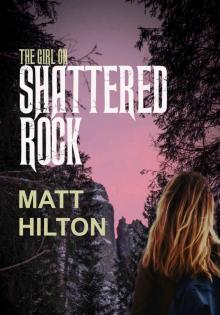 The Girl on Shattered Rock: A gripping suspense thriller
The Girl on Shattered Rock: A gripping suspense thriller Collision Course
Collision Course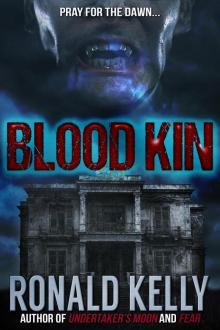 Blood Kin
Blood Kin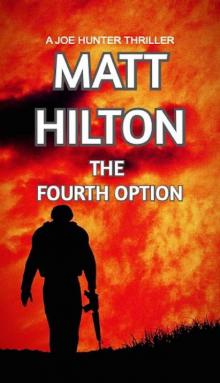 The Fourth Option
The Fourth Option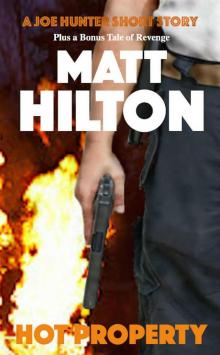 Hot Property: A Joe Hunter Short Story
Hot Property: A Joe Hunter Short Story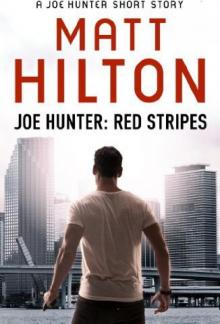 Red Stripes
Red Stripes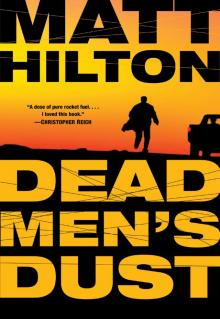 Dead Men's Dust
Dead Men's Dust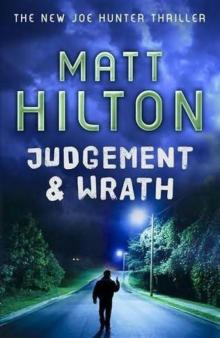 Judgement and Wrath
Judgement and Wrath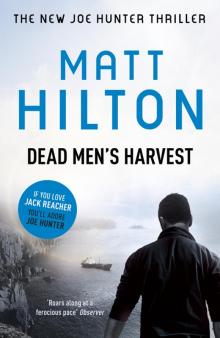 Dead Men's Harvest
Dead Men's Harvest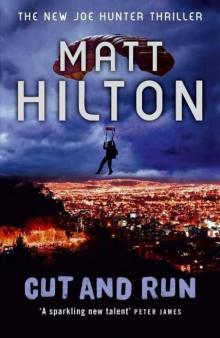 Cut and run jh-4
Cut and run jh-4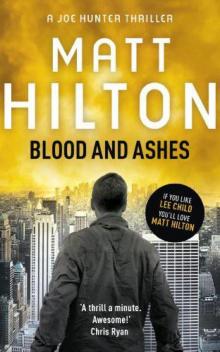 Blood and Ashes jh-5
Blood and Ashes jh-5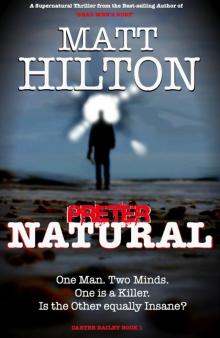 Preternatural: Carter Bailey Book 1
Preternatural: Carter Bailey Book 1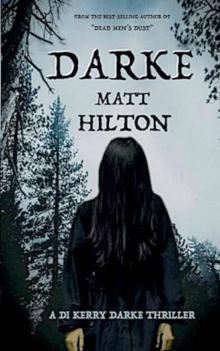 Darke
Darke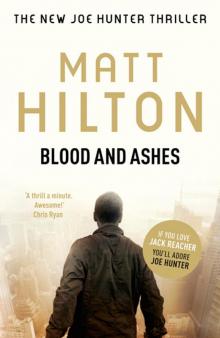 Blood and Ashes
Blood and Ashes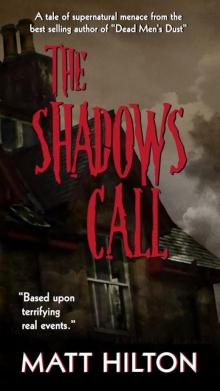 The Shadows Call
The Shadows Call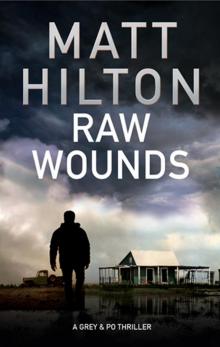 Raw Wounds
Raw Wounds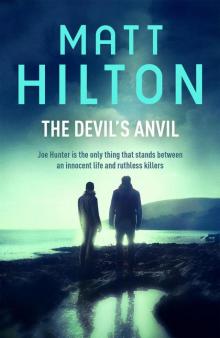 The Devil's Anvil
The Devil's Anvil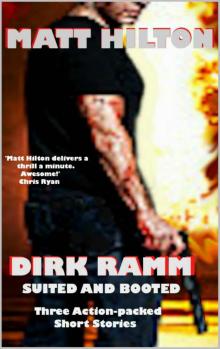 Dirk Ramm: Suited and Booted
Dirk Ramm: Suited and Booted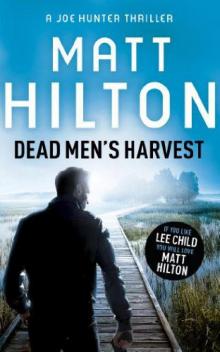 Dead Men's Harvest jh-6
Dead Men's Harvest jh-6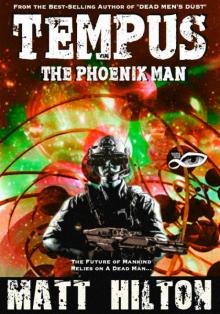 Tempus: The Phoenix Man
Tempus: The Phoenix Man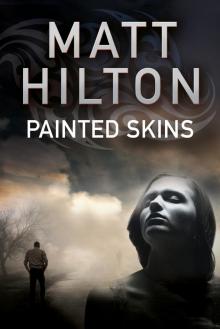 Painted Skins
Painted Skins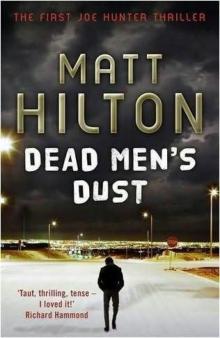 Dead Men's Dust jh-1
Dead Men's Dust jh-1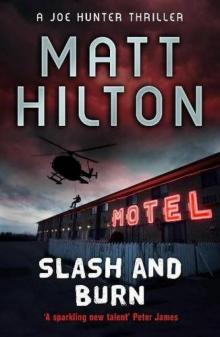 Slash and burn jh-3
Slash and burn jh-3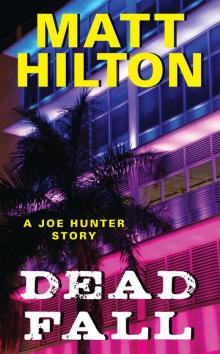 Dead Fall
Dead Fall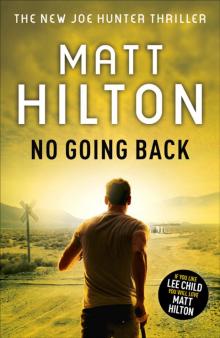 No Going Back - 07
No Going Back - 07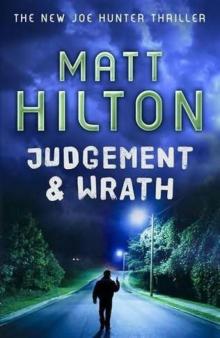 Judgement and Wrath jh-2
Judgement and Wrath jh-2